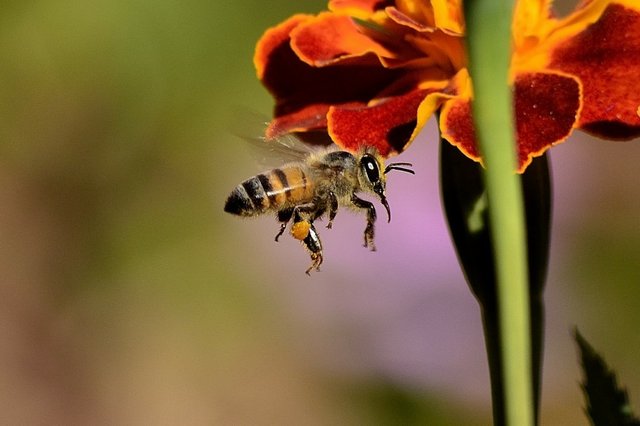'Helpful' Pesticides May Hurt Bees Instead of Helping Them

According to a team of researchers led by a Virginia Tech scientist, pesticides that beekeepers are currently using in order to improve honeybee health may actually be causing damage to the bees by altering the bacteria communities in their guts. The complete discovery has been published in the Frontiers in Microbiology Journal and is an important issue because changes made to the bacteria can affect the stomach of bees' ability to metabolize sugars and peptides which are processes that are vital for overall honeybee health. Beekeepers use the pesticides on hives in order to get rid of harmful parasites such as Varroa mites.
Mark Williams, associate professor of horticulture in the College of Agriculture and Life Sciences and lead author of the study says while helpful for ridding hives of parasites and pathogens, the chemicals in beekeeper-applied pesticides can be harmful to the bees. The research suggests that pesticides could specifically impact the microbes that are crucial to honeybee nutrition and health.
During their experiments, the team of researchers extracted genomic data from honeybees that lived in hives which had been treated with three different kinds of pesticides as well as from those that had not been treated. Samples were taken from hives located in three different places throughout Blacksburg.
Honeybees in hives which had been treated with chlorothalanil showed the largest changes in gut microbiome, according to Williams. The team plans to investigate the specific changes in gut microbiota activities that affect honeybee survival. Honeybees are the foundation of successful and high value food production.
Co-author Richard Rodrigues says the team wants to better describe the core microbiota using bioinformatics to help best characterize the microbes that support healthy honeybees and thus stave off disease in a natural way. He is a postdoctoral researcher at Oregon State University and a graduate student in Williams' lab.
At this time, Virginia alone has a 30 percent hive loss each year, and continued losses are expected to make the cost of important crops that bees make possible to drastically increase. These include apples, melons and squash.

Like what you read (without annoying ads :) ) ? Then please upvote our posts and follow us for the best daily science news on SteemIt!
This is interesting and important information.
It iis already clear that he problem is multifactorial, a couple of factors are already known (monocultures, late blooming cultures, neonictinoïds, varroa,...) the more factors we know, the better our chances of beeting colony collapse disorder.
We definitely need to explore this problem in depth because if the bees will go extinct then humanity will follow soon...
At the moment there is no risk of that happening any time soon.
Industrial beekeeping techniques (like splitting hives during the off-season, industrial production of queens, etc,...) are capable of replacing all the lost colonies on a yearly basis. It is however driving up the price of pollination.
And ofcourse, if the problem would turn worse, a time will come when we can't keep up with the rate of bees dying off, at which time things will become dire indeed.